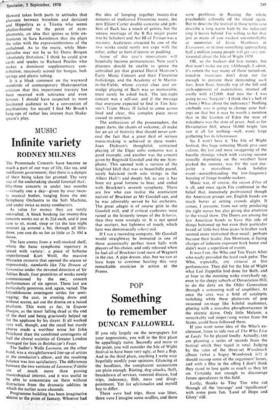MUSIC
Infinite variety
RODNEY MILNES
The Promenade Concerts have become so much a part of our way of life, like tea, and indifferent government, that there is a danger of their being taken for granted. The very size of the undertaking should forestall that :
fifty-three concerts in under two months —virtually one a day—given by over twen- ty musical bodies, ranging from the BBC Symphony Orchestra to the Soft Machine, and under twice as many conductors.
As value for money they are surely unrivalled. A block booking for twenty-five
concerts works out at 4s 23c1 each, and if you care to sit, stand, sleep or (at the late night session) jig around a bit, through all fifty- three, you can do so for as little as 2s 10d a throw.
The fare comes from a well-stocked shelf, where the basic symphonic repertory is spiced with variety: a piece of hitherto unperformed Kurt Weill, the massive Messaien oratorio that opened the season so
impressively, standards like The Dream of Gerontius under the devoted direction of Sir Adrian Bonk, four premieres of works newly commissioned by the BBC, concert
performances of six operas. These last are Particularly generous, and, again, varied. The Glyndebourne contingent settles for semi- staging; the cast, in evening dress and without scores, act out the drama on a raised
platform. This went as far, in Eugene Onegin, as the tenor falling dead at the end of the duel and being graciously helped up
for the applause by his slayer. It all worked very well, though, and the small but sturdy chorus made a worthier noise for John
Pritchard than the combined contingents of half the choral societies of Greater London managed for him in Belshazzar's Feast.
The Sadler's Wells Leonora, on the other hand, was a straightforward line-up of artists
at the conductor's elbow, and the resulting
balance was less satisfactory. The differences between the two versions of Leonora' Fidelio
are of -much more than passing musicological interest, and it was useful to be able to concentrate on them without distraction from the dramatic oddities in Which the earlier score abounds.
Programme building has been imaginative almost to the point of fantasy. Whoever had the idea of lumping together twenty-five minutes of mediaeval Florentine music, the new Elliott Carter double concerto and gob- bets of Bach has a touch of genius, but the uneasy marriage of the B flat major piano trio by Schubert and Act III of Tristan was a mystery. Audiences attracted by one of the two works could surely not cope with the other, either as hors d'oeuvre or pudding.
Some of this year's innovations will hopefully become permanencies. Next year's planners should be unable to ignore the unbridled joy that greeted David Munrow's Early Music Consort and their Florentine frolickings, and the Academy of St Martin- in-the-Fields, whose crystal clear and un- stodgy playing of Bach was so memorable, must surely be asked back. The late-night concert was a sell-out, and if the message that everyone expected to find in Tim Sou- ster's Triple Music II failed to come across loud and clear, this complex piece never ceased to entertain.
The enthusiasm of the promenaders, the paper darts, the chants of welcome, all make for an air of festivity that should never con- ceal the fact that a great deal of serious music-making is achieved in these weeks. Joan Dickson's thoughtful, restrained playing of the Elgar cello concerto was a good example, and another was the concert given by Reginald Goodall and the BBC Sym- phony. This opened with a version of the Siegfried Idyll that was as beautifully paced, nicely balanced (with solo strings in the Albert Hall!) and deeply felt as any it has been my good fortune to hear, and ended with Bruckner's seventh symphony. There are few who can realise the omniscient naiveté of Bruckner as Mr Goodall can, and he was admirably served by his orchestra. The great adagio is of course grist to the Goodall mill, and if critical eyebrows were raised at the leisurely tempo of the Scherzo, then they were wrongly so. It is not speed that matters, but lightness of touch, which here was demoniacally scherz-oid.
If! ran a recording company, Mr Goodall would straightway be immured in one of those acoustically perfect town halls with players of his choice, and only released when he had all of Bruckner (and most of Wagner) in the can. A pipe dream, alas, but we can at least hope to continue hearing this very remarkable musician in action at the Proms.






























 Previous page
Previous page